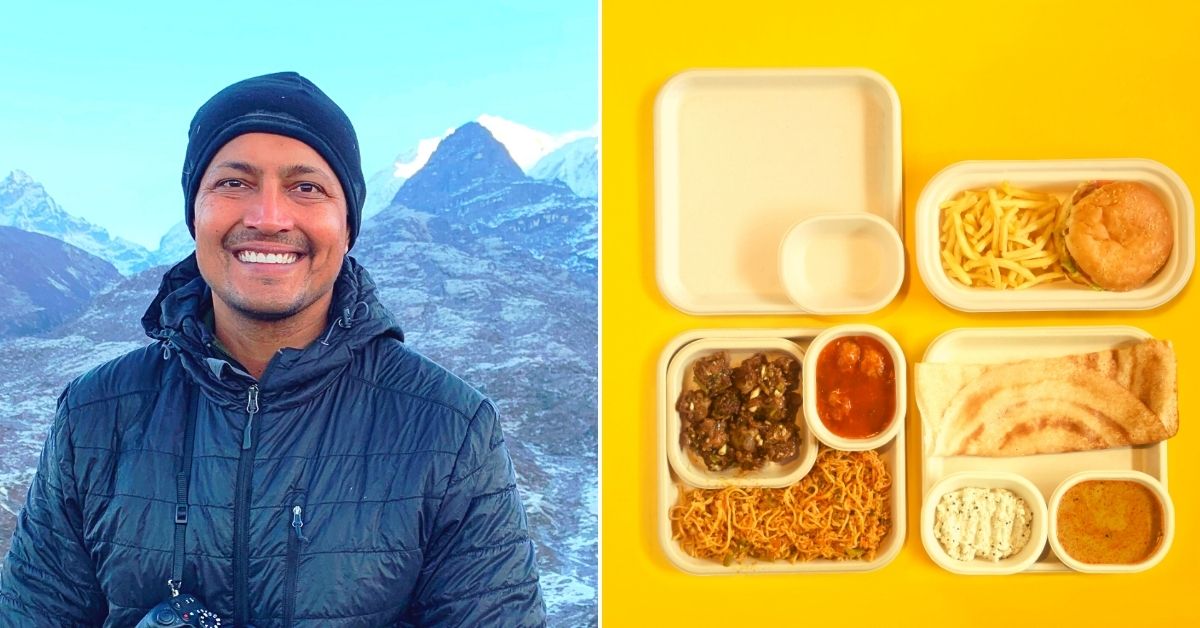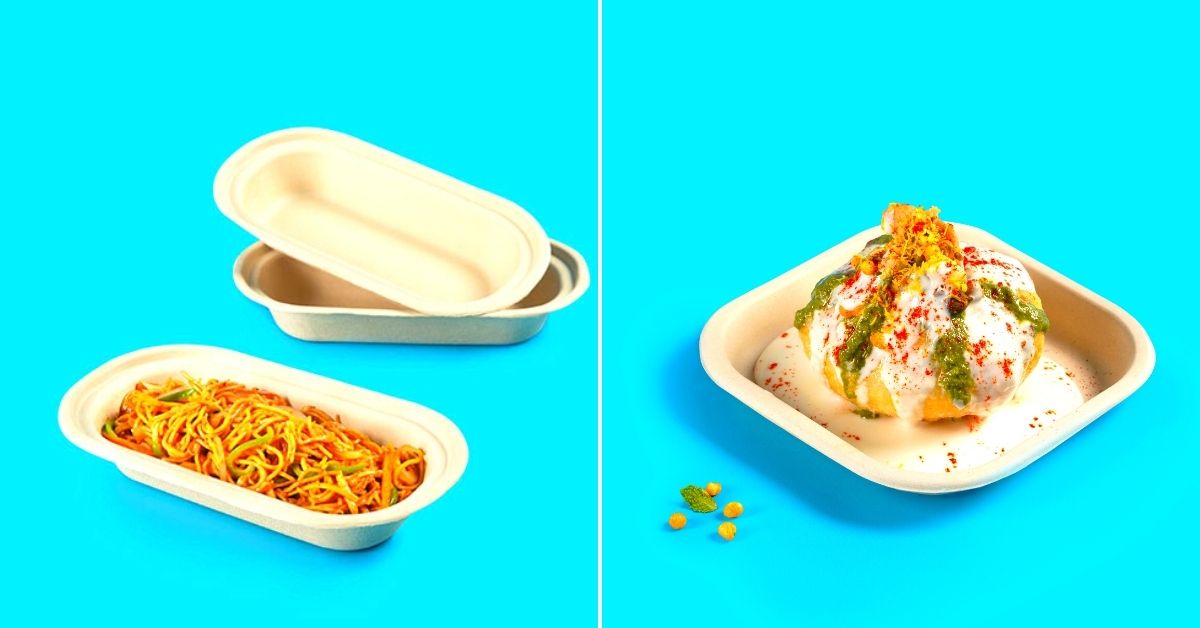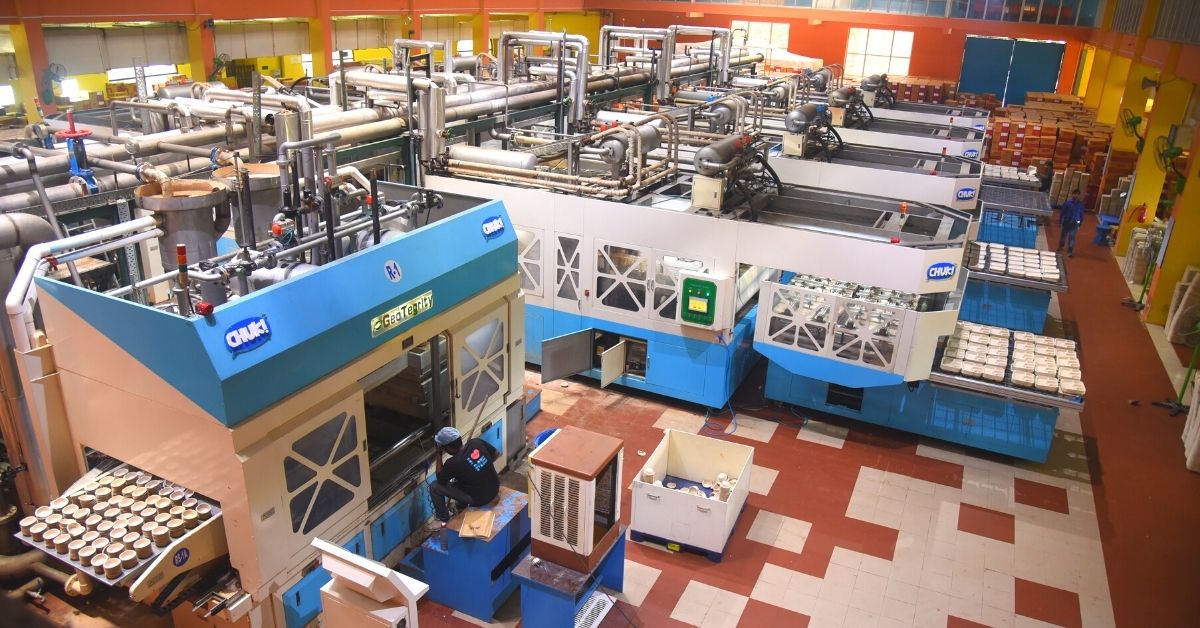Made of Sugarcane Fibre, Disposable Biodegradable Tableware Composts in Just 2 Months
Yash Pakka, an Ayodhya-based venture, manufactures 100% compostable and biodegradable tableware (bowls, plates, food trays, containers) sourced from waste sugarcane fibre.

Yash Pakka, an Ayodhya-based venture, offers compostable products to leading players of the food industry, earning an annual turnover of 183.65 crores (FY 2020-21). Their standout product is Chuk, a 100 per cent compostable and biodegradable tableware (bowls, plates, food trays, containers) sourced from waste sugarcane fibre that helps businesses enable their customers to ‘eat safe’. (Image above of Ved Krishna, head of strategy, at Yash Pakka Limited)
Launched in 2017, Chuk can endure microwaves, ovens and freezers, maintain a sturdy design to ensure your food doesn’t fall out but is lightweight enough to ease the packaging process, and stands ‘free of toxins’, claims the venture.
“We take waste sugarcane fibre from sugar mills located in a 100-mile radius around us, make it into pulp through a standard pulping process which is used for papermaking and then mould it into different shapes to be able to make plates and bowls that can be used as disposables. We have a state of the art modern facility where we utilise the world’s biggest and fastest machines to convert the pulp into different shapes and sizes to provide a range of products that enable foodservice and consumption,” explains Ved Krishna, strategy head of Yash Pakka Limited, speaking to The Better India.
In terms of customers, the venture’s focus is on quick-service restaurants, cloud-based kitchens and delivery service providers. Their biggest customer is Haldiram’s, while they are very active with other ventures like Chai Point, HMSHost, Starbucks, Shree Datta Snacks, Kamath’s Food and MTR, among others. A four-decade-old venture, it took a massive leap in 2019 when Yash Papers rebranded as Yash Pakka, transforming itself from a pulp and paper company into a sustainable packaging one.

Origin Story
Sometime in 2012, the venture started on this journey of converting their entire business from strictly pulp and paper towards compostable packaging. They chose three different areas to make this transition — food carry (from stronger sugarcane-based paper), food packaging (from flexible packaging which takes the paper and adds different layers) and food service (from moulded fibre like Chuk). For the first three years or so, they struggled with the process.
“Initially, we didn’t even know how to do it. Around 2015-16 we found technologies that could enable us to take the pulp and mould it into different shapes. We then went to China and Taiwan and explored numerous suppliers of these available machines. Following this, we chose the biggest manufacturer, bought their eight largest machines, and set it up. In 2017, we started the production of Chuk. To date, we have been able to produce over 10,000 tonnes of material in different shapes and sizes. We have installed a manufacturing capacity of 1 million pieces of tableware per day, alongside their main business of 39,100 MT paper per annum. All of this is powered by an 8.5 MW electricity plant that runs on biomass,” explains Ved.
The basic idea behind Chuk was to change the way food is serviced. As they started doing more research, finding the right technologies and products, their biggest obstacle was the fear of doing something different. Initially, they wanted to produce a round plate that is white in colour and export it. That would have been a standard and commodified business for them.
“One day in 2016, however, I remember waking up at 3 am with my mind buzzing. I had this sinking feeling that we were operating from a place of fear. I had a whiteboard at home and just started drawing a mind map asking why we are being led by fear. That led to four different massive points that became the cornerstone of creating Chuk,” he recalls.
Elaborating on the points he says:
1) Not going down the beaten path. The idea was to design products from scratch which meant studying how people ate across India, seeing how their fingers moved, the angles it moved, the size of cutlery needed and how the range of products worked with each other. “We came out with geometric designs that were modular where each product fits into one another,” he says.
2) Doing things on a scale: The intention was to never do anything on a small scale. Instead of starting small, they wanted to immediately start at scale. That stemmed from a desire to create a big impact. It’s why they bought the world’s largest and fastest machines in this domain.
3) Environmentally conscious: Most products in this space are white and round. The white comes from bleaching. “Why should we bleach? There is no reason for us to do it. So, we decided to go natural and create brown coloured products. Now it seems normal, but at the time people were asking who would buy from us and how Indians wanted it in white, etc,” he says.
4) Create a brand: “We had never done that before with our products. We are from pulp and paper commodity manufacturing. You probably use our paper every day in a bag or a soap wrapper or something you wouldn’t even know that we are the manufacturers of because that’s the kind of domain we came from. When we had this realisation, we wanted to make people more aware of what these products are all about and how they impact us. That was the whole idea behind creating this brand called Chuk,” explains Ved.
Assisting them in the entire process was a design team out of Pune, while they also extensively studied the market. But the foodservice business domain is incredibly dynamic. As Ved recalls, one customer can change the entire situation for the venture.
“For example, we were talking to the famous Tirupati Balaji temple in Andhra Pradesh. Before talking to them, we were hardly able to sell our 9-inch plate (made of waste sugarcane fibre), but they would soon become a singular customer that takes 3 crore pieces a month from us,” he recalls.
That meant setting up more machines for manufacturing. In terms of design, however, they realised that everyone was using a different set of products. Even when you visit a mall or a food court today, some items are in aluminium paper trays, styrofoam and plastic that is shaped round or rectangular, but it all looks very unfamiliar.
“Why not make a whole range of products that sit together as a family and then we look at the idea of modularity. How does one fit into each other? Can one plate hold two bowls easily? So we looked at the geometry of the products and took inspiration from nature. We looked at how products can look more organic and natural and designed it with a sensibility that makes them look similar to each other rather than a dissimilar set of products,” notes Ved.

Into the arms of mother nature
Chuk is essentially sugarcane pulp with a per cent of chemical which stops water and oil from seeping out. “If it’s disposed of properly in a compost pile, it will completely compost in about two months. Most of the time, however, that doesn’t happen. If it’s thrown out in the open, it might take between three and four months to compost depending on what’s around. If an animal eats our cutlery, it’s not a problem. All that an animal eats is sugarcane fibre,” he claims.
Another element on which the brand prides itself in the implementation of strict quality control measures.
“I remember the Chinese team which supplied us the technology came into our facility once and went through our reject pile. They called us crazy, asking why we were rejecting these products. We looked at one of the pieces, and a little fibre was missing, which means you could see light through it, although nothing would leak. This, they argued, was creating losses for us. We responded by saying that it’s about best practices. If we pass an item that is seen through, it could result in a dip in quality because our people may pass something which leaks. We cannot take that risk,” he says.
However, 1 million (10 lakh) pieces a day are made by the venture, and thus there will be one or two that may not be up to their best standard. “Nonetheless, if there is a customer quality complaint, we will take the product back. We also have an in-house research team to study products our customers have rejected for improvements,” he adds.
They believe that this spirit will enable Chuk’s emergence as a global leader in this industry.
We’ll have to see whether they can reach these heights.
(Edited by Yoshita Rao)
Like this story? Or have something to share? Write to us: [email protected], or connect with us on Facebook and Twitter.
If you found our stories insightful, informative, or even just enjoyable, we invite you to consider making a voluntary payment to support the work we do at The Better India. Your contribution helps us continue producing quality content that educates, inspires, and drives positive change.
Choose one of the payment options below for your contribution-
By paying for the stories you value, you directly contribute to sustaining our efforts focused on making a difference in the world. Together, let’s ensure that impactful stories continue to be told and shared, enriching lives and communities alike.
Thank you for your support. Here are some frequently asked questions you might find helpful to know why you are contributing?


This story made me
-
97
-
121
-
89
-
167











